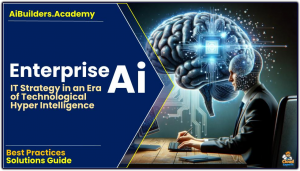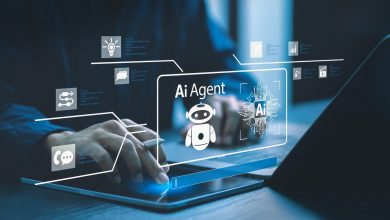 In today’s rapidly evolving digital landscape, artificial intelligence (AI) is poised to revolutionize the way enterprise organizations approach their digital strategies.
In today’s rapidly evolving digital landscape, artificial intelligence (AI) is poised to revolutionize the way enterprise organizations approach their digital strategies.
From enhancing customer experiences to optimizing business operations, AI offers a myriad of opportunities for companies to stay ahead of the curve.
The evolution of enterprise technology has stepped up through the major eras of mainframes and corporate data centres, client/server, Internet, Cloud and now Ai. Like all major leaps of progress it presents a whole new set of challenges and opportunities for CIOs and enterprise technology teams.
Those that master and harness the trend will be able to build Ai into their applications such that they are improved dramatically in their ability to enable and advance the goals of the organization.
Ai-Powered Digital Innovation
AI plays a pivotal role in driving digital transformation within enterprise organizations. By leveraging AI technologies such as machine learning and natural language processing, businesses can gain valuable insights from data, automate processes, and deliver personalized experiences to customers.
One of the key areas where AI can make a significant impact is in enhancing customer engagement. Through AI-powered chatbots and virtual assistants, enterprises can provide round-the-clock support to customers, personalize interactions, and streamline the customer service process.
For example businesses like Tom Tom are harnessing Azure-powered AI to infuse intelligence into the next generation of in-car app services. This is a direct link between technology and market advantage and product innovation. TomTom have leveraged the latest tech advances to make their core product more attractive to consumers and open up a whole new digital marketplace of new revenue stream opportunities.
The Next Era of App Development
AI represents the next era and generation of software development by enabling developers to build smarter, more efficient, and user-centric applications. Embracing AI technologies is essential for staying competitive in the rapidly evolving software industry.
As AI continues to advance, we can expect to see even more innovative applications of AI in software development. From autonomous code generation to self-healing systems, AI is poised to transform the way software is created, maintained, and evolved.
AI technologies such as machine learning, natural language processing, and computer vision are being integrated into software development processes to automate tasks, improve efficiency, and enhance user experiences. Developers are leveraging AI to build smarter applications that can learn, adapt, and make decisions on their own.

Platform Strategy
As like all technologies for large enterprises the first key question is how do they deploy and access this new capability: Build vs buy, in-house vs outsource, Cloud vs on-premise, are all still the building block questions to answer.
For example Walmart built their own in-house Ai platform ‘Element‘, from the ground up, incorporating Walmart’s guiding principles of leveraging best-of-breed technologies, prioritizing speed and scale, while also considering cost and governance.
Its foundation includes Kubernetes for container orchestration and a Machine Learning Operations (MLOps) deployment framework, which supports deploying adaptable, auto-scalable models, all while effectively monitoring them across multiple clouds and regions.
Conclusion
As AI continues to evolve and mature, its impact on digital strategy for enterprise organizations will only grow stronger. By embracing AI technologies and integrating them into their digital strategies, businesses can unlock new opportunities for innovation, efficiency, and growth in the digital age.



